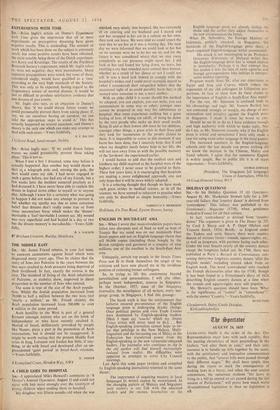EXPERIMENTS WITH TIME
S1R.—Brian Inglis's article on Dunne's Experiment With Time gives the impression that all or most experiments on precognitive dreaming have given negative results. This is misleading. The amount of work which has been done on the subject is extremely small, but some positive results have been obtained, the most notable being those of the Dutch experimen- ters Kooy and Kruisinga. The results of the Psychical Research Society's experiment, which Mr. Inglis refers to, were not negative; they were inconclusive. Many apparent precognitions were noted, but none of these, considered singly, would have qualified as a `case' according to the very high standards of the Society. This was only to be expected, having regard to the fragmentary nature of normal dreams. It would be just as difficult to produce satisfactory evidence that one dreams of past events.
Mr. Inglis also says, as an objection to Dunne's theory, that 'if we could dream future events we could presumably prevent them from taking place; if, say, we see ourselves having an accident, we can take the appropriate steps to avoid it.' This has actually happened on several occasions, and Dunne's theory is the only one which can make any attempt to deal with such cases.—Yours faithfully, I G il ford Road, Sandymount, Dublin G. F. DALTON






























 Previous page
Previous page